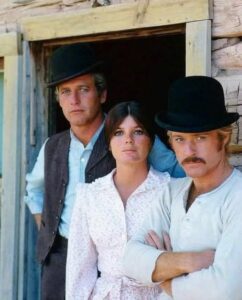 I just watched “Butch Cassidy and the Sundance Kid” for the first time since my formative years. It was poignant because Paul Newman and Robert Redford are now both gone. Katharine Ross (Etta Place) is thankfully still among us, living in Malibu, having performed on stage locally not long ago.
I just watched “Butch Cassidy and the Sundance Kid” for the first time since my formative years. It was poignant because Paul Newman and Robert Redford are now both gone. Katharine Ross (Etta Place) is thankfully still among us, living in Malibu, having performed on stage locally not long ago.
Down the rabbit hole afterward, I learned that many critics initially panned the use of “Raindrops Keep Fallin’ On My Head” during Butch and Etta’s bicycle ride. To me, it just felt like 1969. I used to play it on the piano until people wanted to scream for mercy. Now considered a stroke of meta-music genius, it’s the antecedent of Tarantino’s thrilling use of “I Got A Name” in another great buddy period piece, “Django Unchained.”
It’s a sweet movie until, near the end, our anti-heroes, bank and train robbers fleeing a relentless super posse, try to go straight in Bolivia by guarding a mining company’s payroll. After local bandits murder their genial boss and grab the money, they track the bad guys down with every intention of completing their mission and delivering the payroll. The Bolivians don’t cooperate. In the movie’s grisliest scene, Butch and Sundance kill them in self-defense.
According to the narrative, which one would have to test by reading up on the real-life character, Butch hadn’t killed anyone before. For once, he and Sundance had the law on their side. But their faces say they hated what they’d done. The spent lives weren’t worth the money. It was enough to make the boys give up on going straight, which made them feel worse than being crooks.
In the sixties and seventies, fictional suspects of color were killed by the thousands in movies and TV shows. Millions had died in Vietnam, mostly Vietnamese. This scene turned the tables for a moment on the prevailing morality of violence. By making us care about Butch and Sundance and feel what they did, the filmmakers enabled us to toy with the idea that human life is always worth more than politics and property.
